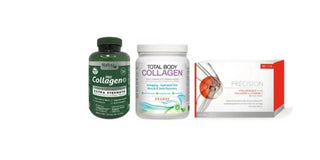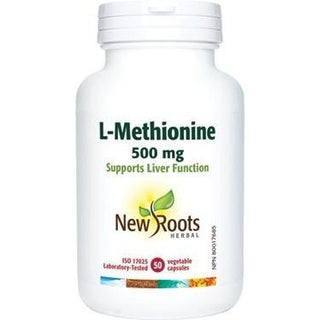New roots - l-methionine 500 mg - 50 vcaps
- Unit price
- / per
Since 1984
Your details are protected and safe with us.
New roots - l-methionine 500 mg - 50 vcaps
- Unit price
- / per
Adding product to your cart
Similar products
Since 1984
Your details are protected and safe with us.
Similar products
Similar products
Product description
ʟ‑Methionine is one of the essential sulphur amino acids. Called a “methyl donor,” ʟ‑methionine contributes to the formation of numerous important compounds in your body; this process is called “methylation.”
The body cannot produce ʟ‑methionine; it must be obtained from food or supplement sources. Methionine functions as a sulphur donor to aid in your body’s detoxification processes and can convert to other sulphur amino acids. ʟ‑Methionine is also a transporter of the antioxidant mineral selenium.
In addition to its role as a precursor in protein synthesis, ʟ‑methionine participates in a wide range of biochemical reactions, including the production of S‑adenosylmethionine (SAMe), ʟ‑cysteine, glutathione, taurine, and sulfates. SAMe itself, as a methyl donor, is involved in the synthesis of creatine, epinephrine, melatonin, and the polyamines spermine and spermidine, among several other substances.
ʟ‑Methionine is classified as an essential amino acid for humans, and therefore must be supplied in the diet. According to the Food and Agriculture Organisation of the United Nations (FAO) and World Health Organisation (WHO), recommended daily ʟ‑methionine intake is 13 mg/kgbw, or about 1 g daily for adults. This is principally derived from dietary proteins; rich sources of ʟ‑methionine include cheeses, eggs, fish, meat, and poultry. ʟ‑Methionine is also found in fruits and vegetables, but not as abundantly. Small amounts of free ʟ‑methionine occur in vegetables, vegetable juices, and fermented foods. Sunflower seeds are an excellent source of methionine, while soy is very deficient. Diets deficient in ʟ‑methionine may result in destructive breakdown and metabolism of protein. ʟ‑Methionine is also a glycogenic amino acid and may participate in the formation of ᴅ‑glucose and glycogen.
Allergies
There is a tendency for allergic (high histamine) persons to be ʟ‑methionine–deficient. They may respond favorably to ʟ‑methionine, because it lowers blood histamine levels.
ʟ‑Methionine is the natural (ʟ) form of this amino acid. The synthetic (ᴅʟ) form is never used in any of our amino-acid products.
DIRECTIONS OF USE
Adults: As a dietary supplement, take 1 capsule once or twice daily with food or as directed by your health-care practitioner.
Discover more similar products
Best sellers
$25.99
- Unit price
- / per
New roots - potassium iodide emergency 65mg - 60 tabs
$47.99
- Unit price
- / per
$47.99
- Unit price
- / per
$24.99
- Unit price
- / per
$25.95
- Unit price
- / per
Ideal protein - omega-3 plus 60 softgels (exp:2025-01-31)
$39.99
- Unit price
- / per
$39.99
- Unit price
- / per
from $31.99
- Unit price
- / per
$34.50
- Unit price
- / per
Med marijuana - mm gel cannabis sativa seed oil - 90 gcaps
$31.99
- Unit price
- / per
$31.99
- Unit price
- / per
$34.50
- Unit price
- / per
Ideal protein - salted caramel flavoured chocolatey clusters
$34.50
- Unit price
- / per
$34.50
- Unit price
- / per
$34.50
- Unit price
- / per
$32.95
- Unit price
- / per
$34.50
- Unit price
- / per
$34.50
- Unit price
- / per
Ideal protein - branched chain amino acids fruit punch - 14 packets
$28.99
- Unit price
- / per
$28.99
- Unit price
- / per
Warning
We strive to provide accurate product information, but manufacturers may sometimes change their ingredient lists, which may result in differences between the information displayed on our website and the information on the product packaging. We recommend that you do not rely solely on the information presented on the site and always read labels, warnings, and directions before using or consuming a product. For additional information about a product, please contact the manufacturer. The information provided on this site is for reference purposes only and does not replace the advice of a licensed healthcare professional. You should not use this information to diagnose or treat a health problem or disease. Contact a healthcare professional immediately if you suspect you have a health problem.
Quick and Efficient



















